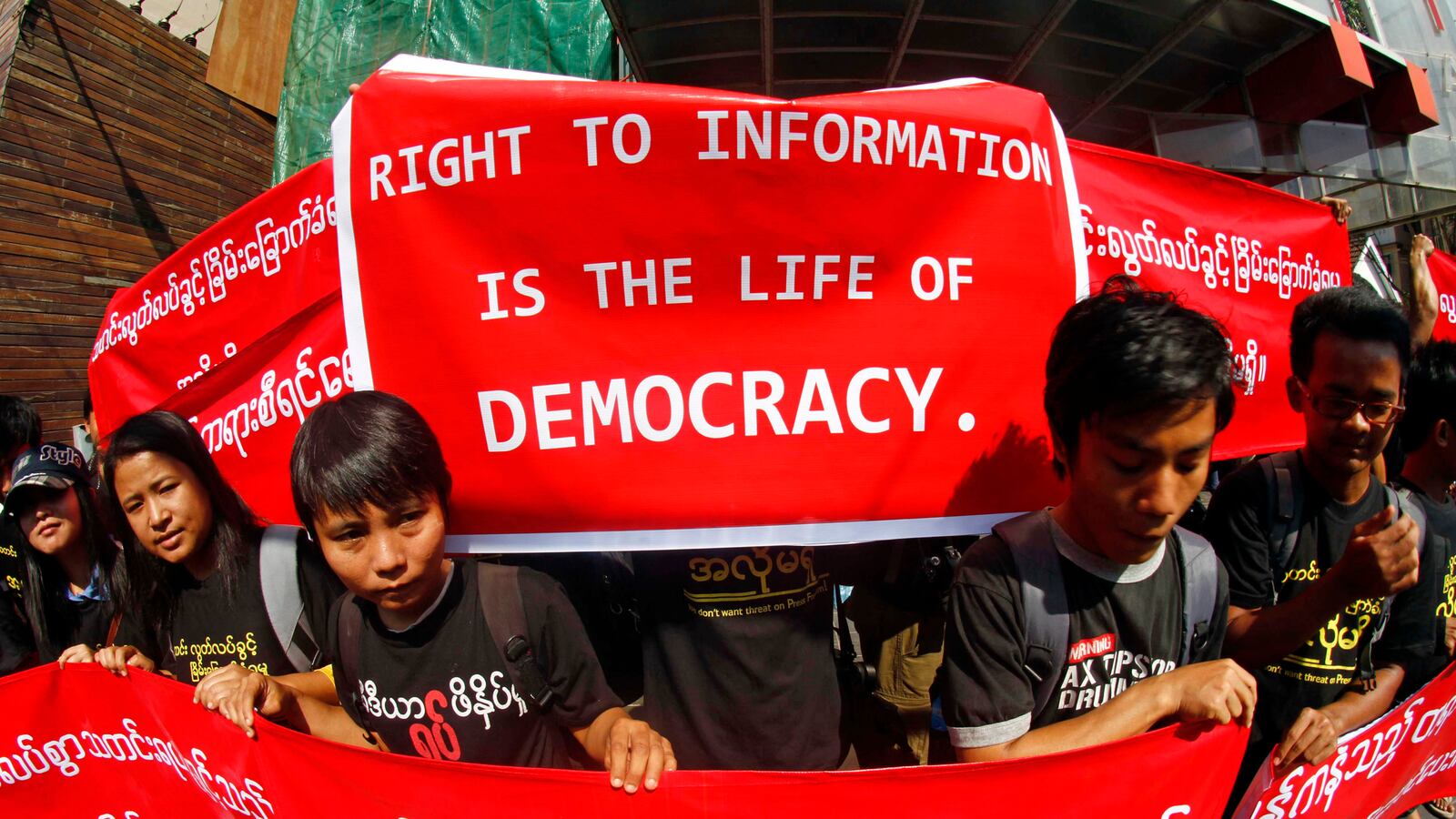PAKOKKU, Burma — Four journalists and the CEO of their newspaper were sentenced to ten years’ hard labor each in Burma this week, sparking outrage from campaigners who say the conviction is a crushing blow to recent media reforms in the country.
The men were convicted under the country’s Official Secrets Act, marking the harshest crackdown on journalists since Burma, or Myanmar, began liberalizing in 2011.
The four reporters worked on stories in late January for the weekly Unity Journal newspaper. Their reports alleged the military had built a chemical weapons factory on 3,000 acres of land seized from farmers in the central Magwe district.
After the judge handed down the sentence many of the journalists' family members were in tears. The mother and sister of one defendant began screaming in the corridor outside the courtroom.
"I shouted that the verdict was decided by the government, not the judge," said Khin Mar Cho after her son Ya Zar Oo was led away from the courthouse in Pakokku, which is in central Burma.
"The whole case reeked of political interference; it smells like a court case from the dark days of military rule," said David Mathieson, an expert on Burma at Human Rights Watch.
Burma spent five decades under cruel military dictatorships that heavily censored the country’s media, until the regime surprised its critics by announcing a series of sweeping reforms.
President Thein Sein’s quasi-civilian government, made up of former military men, came to power in 2011 and set about releasing political prisoners, repairing a dysfunctional economy and ending pre-publication censorship of the press.
But there have been signs of backsliding since December, when a reporter was jailed for three months after working on a story about corruption.
Other reporters have since been arrested, and foreign journalists have complained about having their visas shortened.
Mark Farmaner of the rights group Burma Campaign UK, said Burma has returned to “the bad old days of journalists who upset the government being thrown into jail.”
Amnesty International said in a statement that it “considers all five men to be prisoners of conscience and calls for their immediate and unconditional release.”
The Official Secrets Act, brought in under British colonial rule in 1923, has a clause prohibiting people from approaching designated sites with prejudicial intent. The defense had argued that the suspicious factory was not properly designated, and claimed that signs warning against trespassing were put up only after the journalists were arrested.
The Unity Journal has since gone out of business under the financial strain of paying legal fees, local media reported.
After the sentence was handed down, the men were led in handcuffs out of the courthouse amid crowds of people. Some shouted messages of support as the five walked to a truck for the short ride to the nearby jail.
Opposite the courthouse, across a dusty highway, was a large red government billboard reading, “Love the mother country, respect the law.”
The families' hopes now rest on a complex appeals process, the first stage of which will take about three months, says Wa Win Maung.
But Khin Mar Cho is pinning her hopes on the international community. "I have no faith in the Burmese government anymore," she said. "I'm just waiting for pressure from the West. If there is pressure my son will be free."
She may be waiting for some time. “Increasing press freedoms were hailed by western governments as one of the most significant reforms," said Farmaner. "Now that there is backsliding on the reforms western governments are silent.”
Shortly before Thursday’s verdict, a spokesperson at the British Embassy in Burma’s main city of Rangoon said she wasn’t aware of any plans to issue a statement on the trial.
On Friday a press officer at the US State Department, Peter Velasco, told the Associated Press the sentence sent the “wrong message” about Burma’s commitment to free speech. He urged the country to respect the rights of journalists.
As Lwin Lwin Myint waited with two of her seven children to attend court on Thursday morning, her husband’s lawyer produced a picture on his phone of three of his codefendants. In it they're sitting with their arms raised to show their handcuffs, as if proud of them. Si Thu Soe is grinning as he brandishes his.
Lwin Lwin Myint smiled too. “They’re always defiant,” she said.






